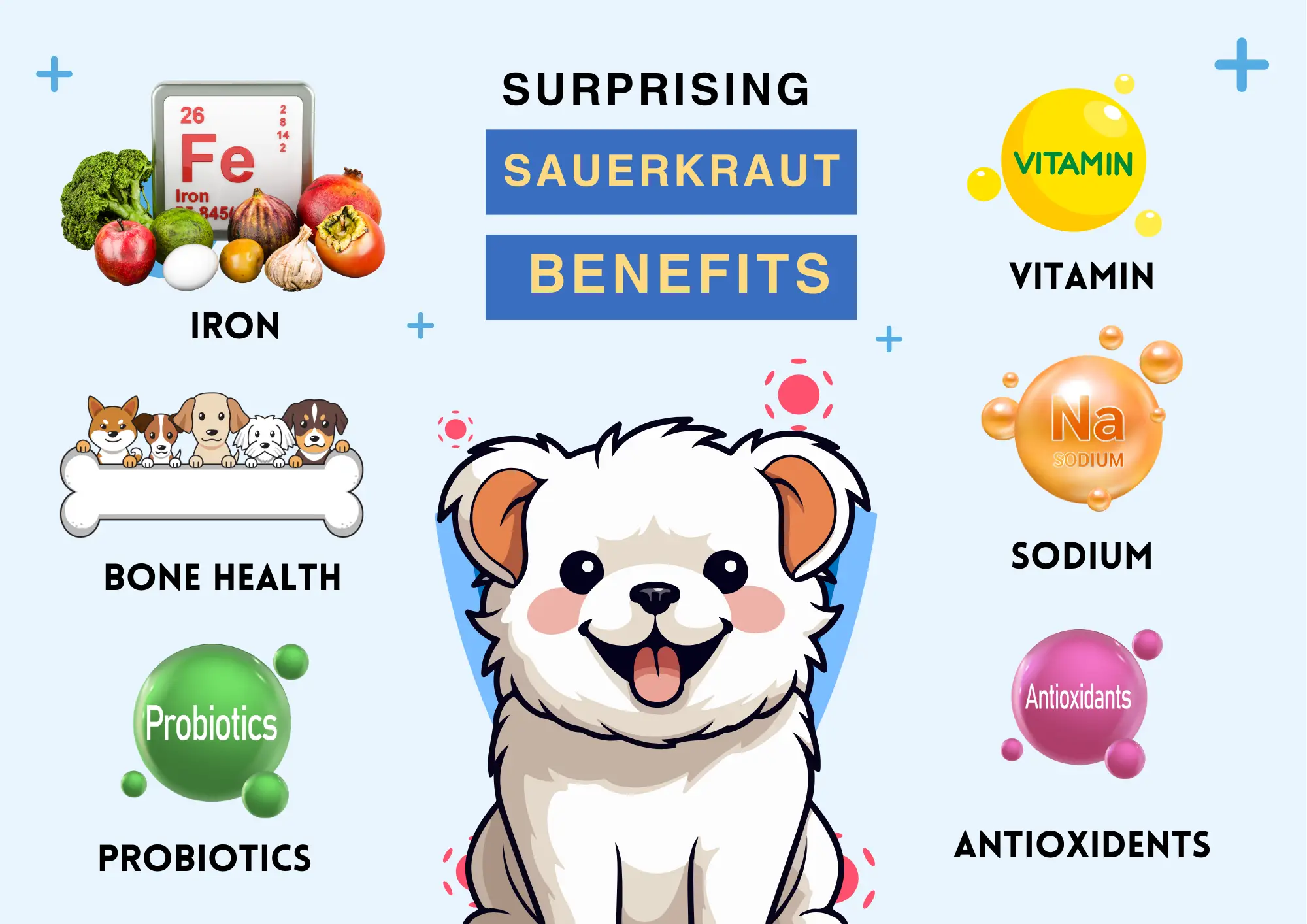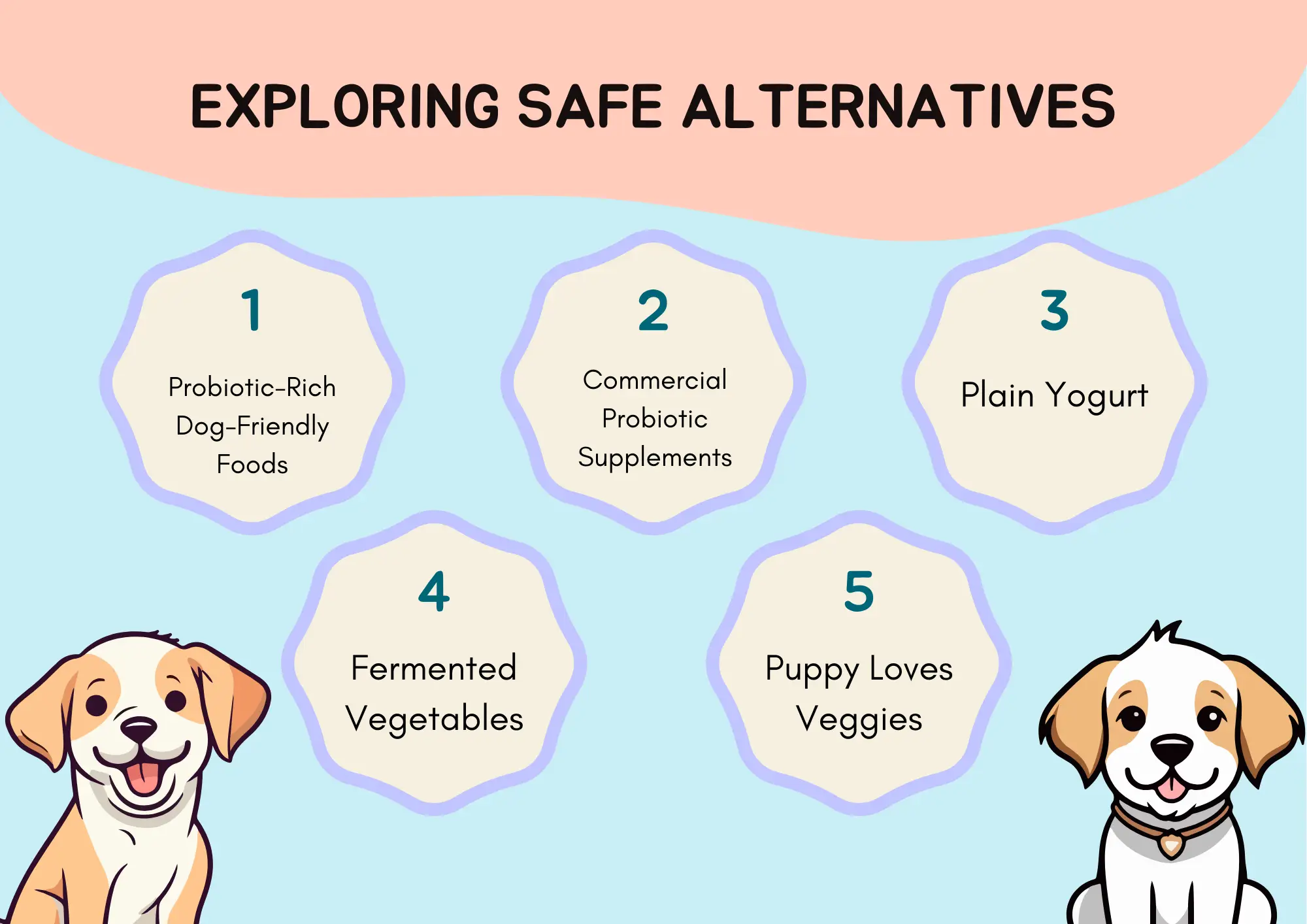Thinking about giving your dog sauerkraut? It can be a tasty treat, but only in the right situations. This tangy, fermented cabbage can be a nutritious food choice that creative owners can incorporate into their pet’s diet. In this blog, we’ll cover all the factors to consider, like ensuring the sauerkraut is finely cut, fresh, and free from spices that might bother your dog’s sensitive nose and palate.
Remember, some dogs might not like its strong smell and taste, but for those who do, it can be safely eaten alone or added to flavor their meat dishes or hot dogs. Always check with your vet to make sure it’s suitable for your dog, especially under their unique health conditions.
Table of Contents
ToggleCan Dogs Eat Sauerkraut?
Yes, dogs can eat sauerkraut. It’s a fermented food made from finely cut cabbage and can be a nutritious addition to their diet if served plain and without added spices or salt. Always check with your vet to ensure it’s safe for your specific pet, especially if they have dietary restrictions or health concerns.

What Is Sauerkraut?
Sauerkraut is a type of fermented food that comes from finely shredded cabbage. It’s made by a cool fermentation process where lactic acid bacteria break down the sugars in cabbage, creating that tangy and sour flavor we know. The word “sauerkraut” comes from German and means “sour cabbage.”
This traditional dish is not just tasty; it’s also rich in nutrients and has lots of health benefits, like vitamins that can help prevent scurvy. People enjoy its distinctive texture and sweet yet pickled taste. Plus, the organic acids and beneficial bacteria that develop during the transformation are great for your health!
What are Sauerkraut Probiotics, and How Do They Improve a Dog’s Health?
Sauerkraut is an excellent addition to a dog’s diet, offering numerous health benefits thanks to its rich content of vitamins and minerals. It provides about 6g of carbohydrates, 1.3g of protein, 241 mg of potassium, and essential electrolytes, which help maintain cellular balance and hydration. Vitamin A and Vitamin C are powerful antioxidants that protect against free radicals, enhancing eye health and skin quality while supporting overall energy levels.
Iron and Magnesium play crucial roles in oxygen transport and enzyme function, which is important for healthy bones, muscles, and intracellular fluids. Beyond nutrition, sauerkraut offers significant probiotic benefits, containing beneficial Lactobacillus strains that support a healthy canine gut and protect against gastrointestinal diseases and infections like candida and salmonella. According to a PubMed study, “global analysis of data gathered during this study highlighted the identification of three Lactobacillus strains with putative probiotic potential, suggesting the applicability of sauerkraut fermentations as a source for probiotic isolation.”
This fermented food also boosts digestion, reduces cancer risk with isothiocyanates, and supports brain development and eye health through omega-3 fatty acids and antioxidants like zeaxanthin and lutein. Always serve it fresh and in moderation, consulting a vet to ensure it complements your pet’s diet for optimal health.
11 Surprising Sauerkraut Benefits:
- Iron: Sauerkraut is rich in iron, vital for dogs to boost energy, regulate metabolism, and support blood circulation. Adequate iron helps organs function properly, preventing mental slowness, tiredness, and anemia in your warm-blooded friend.
- Skin and Coat Health: Rich in vitamin A and carotene, sauerkraut boosts skin and coat health, reducing itchy, dry skin and promoting healthy tissue growth. Vitamin C and K also support immune system function and strong teeth and bones.
- Immune System Functioning: A cup of sauerkraut provides vitamin C, enhancing the immune system by increasing white blood cell production, aiding cellular regeneration, and supporting overall organ and bone health.
- Anti-inflammatory Properties in Sauerkraut: Sauerkraut contains phytonutrients and antioxidants that help reduce muscle and joint pain and combat arthritis. The probiotics in it also improve allergies and enhance overall health and well-being.
- Bone Health: Sauerkraut is loaded with minerals like vitamin K2, essential for maintaining strong bones in both puppies and adult dogs. It helps strengthen and preserve the health of mature bones.
- Sauerkraut and Salt Content: While sauerkraut offers many health benefits, its high sodium content can be a concern for dogs with kidney or cardiovascular disorders. It’s important to consult a veterinarian and monitor its impact on your dog’s diet and health.
- Heart Health: Probiotics in sauerkraut help lower cholesterol levels, which is beneficial for older, heavier dogs with obesity-related heart problems. It supports heart health by improving fat absorption and reducing weight.
- Good for the Dog’s Guts and Allergies: Sauerkraut is excellent for a dog’s guts, packed with healthy bacteria and fiber that support digestion and alleviate symptoms of allergies like itching and scratching.
- Reduce Joint Pain: The anti-inflammatory properties of sauerkraut, rich in phytonutrients and antioxidants, help alleviate joint pain, making it beneficial for feeding dogs with joint issues.
- Eye Health: Fermented foods like sauerkraut are beneficial for eye health, containing vitamins that help reduce the risk of cataracts in older dogs.
- Gastrointestinal Health: Sauerkraut’s fermentation produces probiotics that help maintain gut health, easing issues like constipation, bloating, and flatulence. Its fiber-rich content aids in preventing gastric ulcers and managing irritable bowel syndrome (IBS). A study published on PubMed found that “L. plantarum NA exhibited antioxidant and immune-stimulating activities similar to live cells,’ and ‘L. plantarum NA was resistant to simulated gastrointestinal conditions in vitro.”
My puppy Luna really loves veggies and gets so happy every time she smells sauerkraut. It’s funny because she gets so into it, especially when I toss some sauerkraut in a bowl with her regular food. She even acts like it’s the best thing ever, even though we joke that she enjoys nuts just as much.
Considerations When Feeding Sauerkraut to Dogs
- High Sodium Content: Sauerkraut contains high levels of sodium, which can cause health issues like high blood pressure and dehydration in dogs. When using sauerkraut in recipes, ensure that the salt content doesn’t exceed your dog’s daily sodium intake limits. If you’re wondering about other foods with similar concerns, you might want to check out our post on Can Dogs Eat Bologna?
- Flavor and Preference: Dogs have different taste preferences from humans. Some may love the strong, tangy flavor of sauerkraut, while others may not enjoy it. Dogs with sensitive stomachs might be turned off by the strong flavors or textures of sauerkraut.
- Potential Gastrointestinal Upset: Introducing sauerkraut as a new food could lead to gastrointestinal upset like gas, bloating, or discomfort due to the fermentation process. Some dogs may experience digestive issues or changes in their gastrointestinal systems when trying sauerkraut.
- Individual Dog’s Health Status: Before adding sauerkraut to your dog’s diet, consider their health status, including any preexisting conditions or sensitivities. Always consult with a veterinarian if your dog has a sensitive stomach, allergies, or any special dietary needs.
Exploring Safe Alternatives:
For probiotics, consider safer, suitable alternatives like dog-friendly probiotic supplements that promote gut health. If sauerkraut doesn’t work for your dog, look into other probiotic options that are formulated for canine needs. You can also explore other dog-friendly foods like potatoes.
- Probiotic-Rich Dog-Friendly Options: Some reputable pet food companies offer probiotic-rich options designed to support gut health in dogs, tailored to their dietary needs. You can add probiotics to your dog’s diet through specialized dog food or supplements.
- Commercial Probiotic Supplements: These are specifically designed for dogs, catering to their unique dietary and gut health needs. These can be a great alternative to sauerkraut for promoting gut health in dogs.
- Plain Yogurt: Plain, unsweetened yogurt is another source of probiotics that some dogs may enjoy, especially those who are lactose-tolerant. It’s a good option for adding probiotics to your dog’s diet if they can tolerate dairy.
- Fermented Vegetables: Fermented vegetables like carrots and green beans in small amounts can be a healthier alternative to sauerkraut as long as they are free from added salts or seasonings. These vegetables offer some of the same fermented benefits without the sodium risks.
- Puppy Loves Veggies: Some dogs, like a puppy excited about veggies, may go crazy over the smell and flavor of sauerkraut. It’s a fun reason to toss a little into their bowl but keep it in moderation as part of their regular food.
Which kind of sauerkraut can dogs eat?
- Commercial, Refrigerated Sauerkraut: Store-bought refrigerated sauerkraut is often the freshest option and typically contains live probiotics, but it may also have higher levels of salt or preservatives.
- Canned Sauerkraut: Canned sauerkraut is convenient but often contains more salt and may lack live probiotics due to the canning process.
- Homemade Sauerkraut: Homemade sauerkraut allows you to control the ingredients, including the salt and fermentation time, offering a fresher option with live probiotics.
- Cooked Sauerkraut: Cooked sauerkraut loses many of its live probiotics during the cooking process but can still offer some nutrients and flavor.
How to make sauerkraut for dogs at home?
Ingredients
- Green cabbage (1 medium head)
- Kosher salt (around 1 tablespoon per 1 medium head of cabbage)
- Water (enough to dissolve salt)
- Mason jar or any canning jar
- Cloth, rubber band, or twine for sealing
- Stone or marble to weigh down the cabbage (about 1 or 2 large stones)
Steps
- Rinse the cabbage thoroughly to remove any soap residue, and wash your hands.
- Remove the outer leaves and cut the cabbage into quarters and wedges, discarding the core.
- Slice the cabbage into ribbons or small pieces like coleslaw.
- Place the sliced cabbage into a bowl and sprinkle with kosher salt, about a teaspoon per cup.
- Massage the salt into the cabbage to help it release its natural, watery juice.
- Pack the cabbage tightly into the mason jar, pressing it down with your fist or a stone to make sure it’s submerged in its own liquid.
- Cover the jar with a cloth and secure it with a rubber band or twine to allow airflow and keep out dust or insects.
- Let the jar sit at room temperature (around 65°F to 75°F) for fermentation.
- Check the cabbage every day to ensure it’s still fully covered by the liquid.
- After 2 months, your homemade sauerkraut will be ready!
- Store in the fridge and use within months.
Final Thoughts
While sauerkraut can offer some potential benefits for dogs, like probiotics for gut health, it also comes with some drawbacks. The high sodium content in sauerkraut can cause digestive upset and other health issues for dogs, making it a less suitable option for some pets. It’s always worth considering these factors before offering it to your dog and exploring safer alternatives like plain yogurt or fermented vegetables. Always check with your vet to ensure you’re making the best choice for your dog’s health.
FAQs
Can Dogs Eat Homemade Sauerkraut?
Yes, dogs can eat homemade sauerkraut, but it’s important to follow the right recipe and make sure you control the ingredients. Homemade sauerkraut lets you avoid excessive salt or caraway seeds, which can be toxic for dogs. The process involves Lacto-fermentation, where sugars in cabbage are converted into lactic acid, creating a sour taste and brine solution. It’s best to serve it plain and without extra spices. If made right, homemade sauerkraut can be a healthy benefit for your dog.
How Much Sauerkraut Can I Give My Dog?
You can give your dog about 1 tablespoon of sauerkraut per meal, which is roughly 1/4 cup. It’s packed with vitamin C, which helps boost their immune system and white blood cell production. But don’t give too much; start with small amounts and see how your dog reacts. Too much could lead to digestive issues.
Is Sauerkraut a Good Probiotic for Dogs?
Yes! Sauerkraut is full of natural probiotics, which help the gut bacteria stay balanced. The Lactobacillus brevis and L. plantarum strains found in raw, plain, and unpasteurized sauerkraut are great for supporting your dog’s digestive health. If your dog eats wet dog kibble, sauerkraut can also help boost their gut health. Just remember to skip the caraway seeds.
Is 1 Cup of Sauerkraut Too Much?
According to USDA guidelines, 1 cup of sauerkraut contains about 4 grams of fiber. The Dietary Guidelines suggest that dogs should only have a small serving of fiber, so 1 cup of sauerkraut may be too much for most dogs. A half cup (around 120 grams) is usually the recommended serving size for humans, but for dogs, start with a smaller amount.
When Should You Not Eat Sauerkraut?
You should avoid giving sauerkraut if your dog has a cabbage allergy or is sensitive to histamine. Some dogs might experience digestive discomfort, bloating, or even headaches after eating sauerkraut. If you notice these reactions, stop feeding sauerkraut and talk to your vet. Always check for any unusual symptoms after giving them new food.



